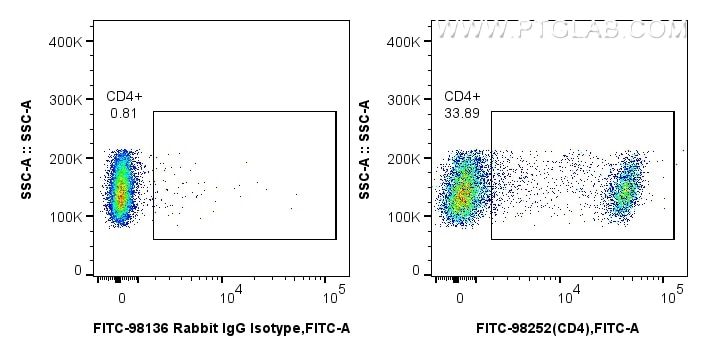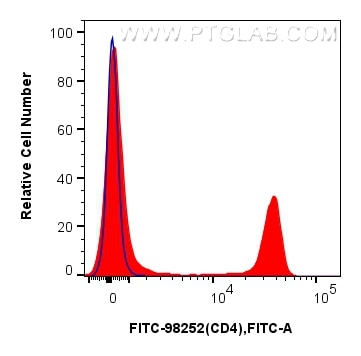Tested Applications
| Positive FC detected in | rat splenocytes |
Recommended dilution
| Application | Dilution |
|---|---|
| Flow Cytometry (FC) | FC : 0.25 ug per 10^6 cells in a 100 µl suspension |
| This reagent has been tested for flow cytometric analysis. It is recommended that this reagent should be titrated in each testing system to obtain optimal results. | |
| Sample-dependent, Check data in validation data gallery. | |
Product Information
FITC-98252 targets CD4 in FC applications and shows reactivity with rat samples.
| Tested Reactivity | rat |
| Host / Isotype | Rabbit / IgG |
| Class | Recombinant |
| Type | Antibody |
| Immunogen | CD4 fusion protein Eg2025 Predict reactive species |
| Full Name | Cd4 molecule |
| Calculated Molecular Weight | 51 kDa |
| GenBank Accession Number | NM_012705.1 |
| Gene Symbol | Cd4 |
| Gene ID (NCBI) | 24932 |
| Conjugate | FITC Plus Fluorescent Dye |
| Excitation/Emission Maxima Wavelengths | 495 nm / 524 nm |
| Form | Liquid |
| Purification Method | Protein A purification |
| UNIPROT ID | P05540 |
| Storage Buffer | PBS with 0.09% sodium azide, pH 7.3. |
| Storage Conditions | Store at 2-8°C. Avoid exposure to light. Stable for one year after shipment. |
Background Information
CD4 is a 55-kDa transmembrane glycoprotein expressed on T helper cells, majority of thymocytes, monocytes, macrophages, and dendritic cells (PMID: 9304802; 12213222). CD4 is an accessory protein for MHC class-II antigen/T-cell receptor interaction. It plays an important role in T helper cell development and activation (PMID: 9539765; 3112582). CD4 serves as a receptor for the human immunodeficiency virus (HIV) (PMID: 9304802).
Protocols
| Product Specific Protocols | |
|---|---|
| FC protocol for FITC Plus CD4 antibody FITC-98252 | Download protocol |
| Standard Protocols | |
|---|---|
| Click here to view our Standard Protocols |





